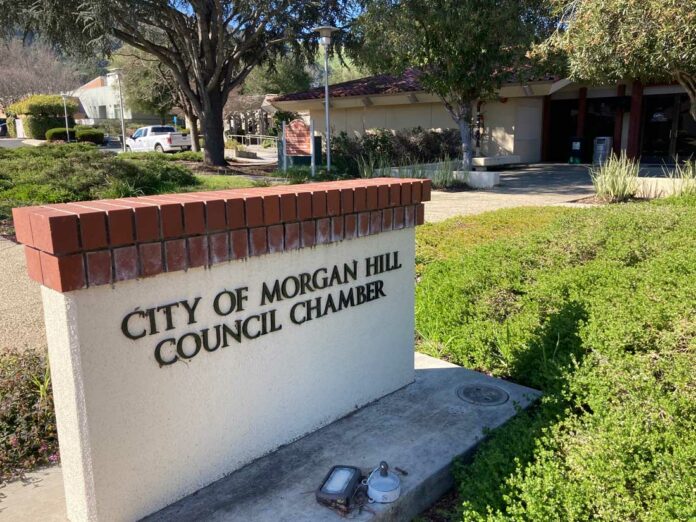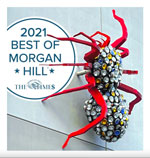The Morgan Hill City Council and those in the live and remote audience were subjected to antisemitic and anti-LGBTQ+ remarks during the Oct. 4 meeting’s public comment period.
Council members and city officials resoundingly condemned the comments, which were broadcast via Zoom by three different people at the meeting. However, the city has to walk a “fine line” in any potential effort to limit such comments because they are protected under the U.S. Constitution, Mayor Mark Turner said.
Turner noted in a statement after the Oct. 4 meeting that those exposed to the offensive comments included numerous local high school students who were in the live audience at council chambers on Peak Avenue.
Turner called the comments “the worst humanity has to offer.”
“Of course, they (made these comments) over Zoom, not showing their faces nor providing their real names,” Turner’s statement reads, in part. “Their despicable comments were as offensive as they could be.”
He added, “All members of our city are valued, regardless of religion, immigration status, ethnicity, disability, gender, sexual orientation or gender identity. We reject this sort of behavior, will call it out when we see or hear it, and do all we can, within our legal rights, to not allow it in our council meetings.”
The comments occurred during the public comment portion near the beginning of the Oct. 4 meeting, reserved for subjects that are not on the agenda. The council routinely includes such a public comment segment on each meeting agenda.
Three people who called in under first names only, used their time to make the offensive comments. As the third speaker was running out of time, he began shouting profanities and Turner cut him off.
After the second caller, Turner paused the public comment segment to gain input from City Attorney Don Larkin, who said that the First Amendment of the Constitution gives everyone the right to free speech “no matter how awful those grievances may be and no matter how reprehensible their comments.”
Larkin added, “In Morgan Hill, our city council has consistently affirmed the city is an inclusive community and one that welcomes people of all faiths and beliefs, and the comments we’re hearing don’t reflect the views of the City of Morgan Hill.”
After the third caller, Turner closed that portion of the meeting, citing the fact that others had signed in on Zoom only after the call-in session had begun—which is typically against the city’s public comment policy.
This was the first time that the Morgan Hill City Council has dealt with antisemitic and hate speech at a public meeting. But many other cities and government boards in California have been hit with similar comments since they began broadcasting meetings and allowing remote verbal comment during the pandemic.
The Walnut Creek City Council announced Oct. 3 that it will no longer accept remarks via phone and Zoom at public meetings, because it has been bombarded for months with harassment by antisemitic callers. Sonoma County, Redwood City and Fremont have also stopped allowing public comments over the phone or Zoom for similar reasons, according to Bay City News.
Some Morgan Hill City Council members said if it continues to happen at their meetings, they would consider prioritizing a discussion on how to similarly limit the likelihood of such offensive remarks occurring again.
“I’m not ruling out anything at this point,” said Councilmember Rene Spring, the city’s first openly LGBT councilmember. “It was the first time we’ve had to deal with it. If it keeps happening, (discontinuing public comment by Zoom) might be something we have to look into as well.”
Spring, who noted he was physically shaken by the comments for hours after the meeting, added, “I am 100% sure those (callers) are not local—they’re calling in from somewhere else, not with their real names. Let’s hope that it doesn’t happen again.”
A drawback to prohibiting remote public comment is it would also rule out residents of Morgan Hill who have legitimate comments, questions, complaints or suggestions for the council but are unable to attend a meeting in person. Still, Councilmember Marilyn Libers, who called the Oct. 4 comments “extremely offensive,” noted that anyone can still submit their public comments by email or writing if they cannot attend meetings in person.
Councilmember Yvonne Martinez Beltran suggested perhaps the council could look into a way to “screen or vet” callers before they go live at meetings, but she thinks the council should lean toward having an in-depth discussion about their options at a future meeting.
Those who make such calls to public government meetings seem to be part of a loosely organized group or groups whose strategy includes taking advantage of the nameless, faceless nature of remote public commenting access to spread their beliefs, Turner and other observers noted.
Walnut Creek City Councilmember Kevin Wilk, who is Jewish and has been personally named by antisemitic callers to meetings in that city, said it’s a strategy used by far-right, white nationalist groups to broadcast their messages, Bay City News reported. The strategy has been witnessed in other cities that have since stopped allowing remote public comment, as well as San Jose, Richmond, San Francisco and others.
The state’s Brown Act, which governs public access to government meetings, only requires cities to offer the public a chance to comment at public sessions in person. Since the pandemic, many cities have continued to allow the public to comment by Zoom or phone.
Turner added in his statement, “I want to apologize to those in attendance at our Oct. 4 council meeting who had to bear witness to such bigotry and discrimination. Be assured, we do not support such comments but instead remain committed to a diverse and inclusive environment where all can be fairly and freely represented with respect and understanding.”









We cannot let the violent and vile people of this world shut down our ability to comment, communicate, and collaborate!!! MH Citizens have a right to deliver our concerns and constructive ideas to our leaders!!! The MH City Council can employ a process to ensure that public comments are constructive without being harmful to our community:
1. Public comments to be submitted prior to Council meetings, with name and valid email address.
2. Public speakers register to deliver their public comments at council meetings by providing name, valid email address, and Zoom Identifier.
3. City Council can determine if speaker is adhering to their submitted comment, and identity online, and can determine to shut the speaker down.
It is important to distinguish between those individuals who hide behind the veil of anonymity and whose only motive for their comments is to express hatred, contempt, and to express divisive opinions, and the comments of those citizens who are interested in participating in the governmental process by expressing legitimate opinions expressive of their position on issues being considered by our elected officials, and which may assist in the council’s decisive vote on those issues. For some individuals, being able to communicate via Zoom because of time constraints or family or work responsibilities is important. Barring those latter citizens from participating through Zoom in the democratic process is a big win for those who made the comments with the intent to incite divisiveness. The City staff should assess whether the parameters of the Zoom application can be set up to identify anyone wishing to comment, since that is the main concern raised in the article. The Council can require that anyone making a comment through Zoom must be identified before they are allowed to make a public comment.